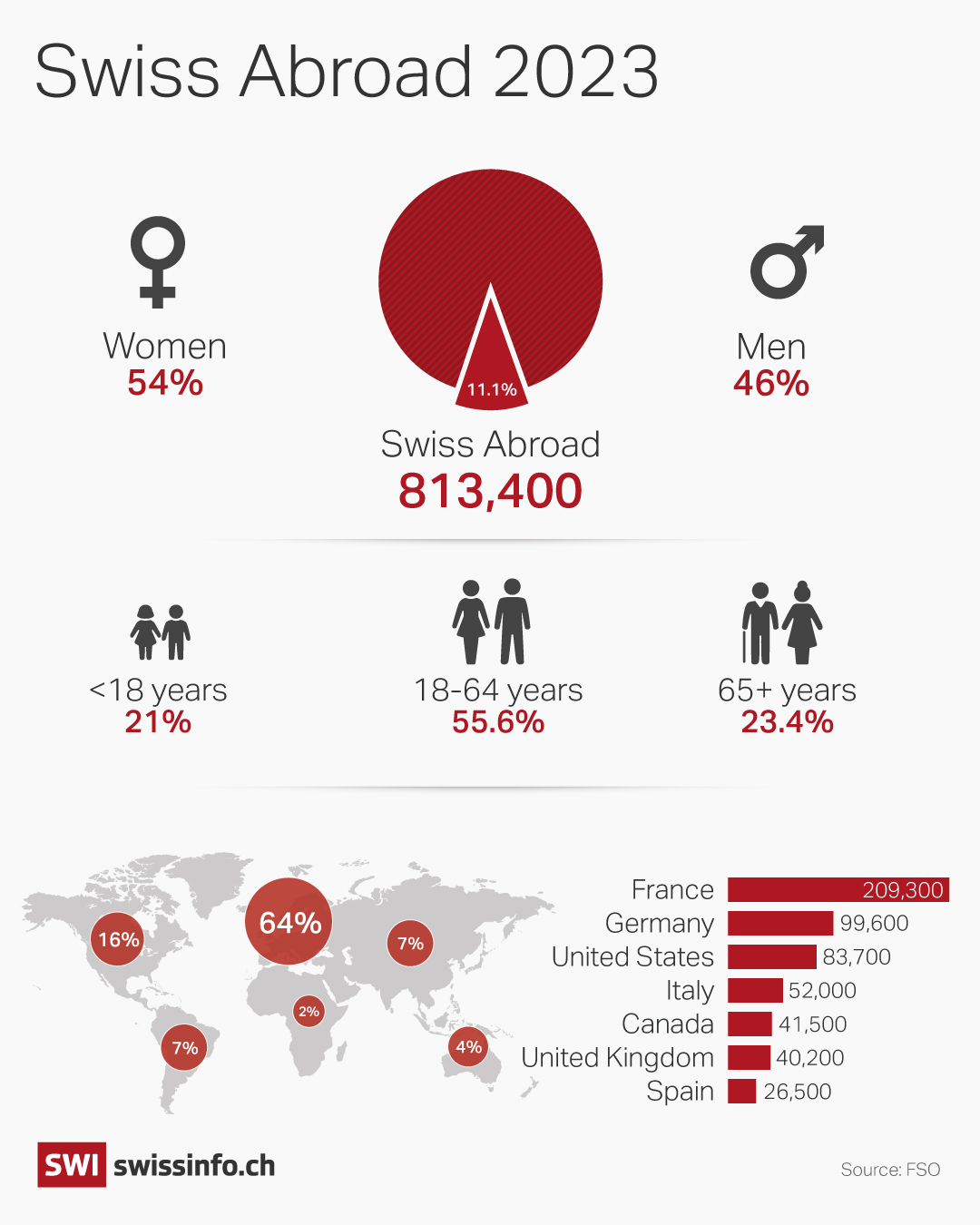The number of Swiss around the world grew by 1.7% in 2023

According to annual statistics, almost two-thirds of Swiss Abroad live in Europe, with France the most common destination. Almost a quarter of all Swiss around the world are pensioners.
On December 31, 2023, a total of 813,400 Swiss nationals were registered abroad, the Federal Statistical Office (FSO) said on Thursday. The 1.7% increase comes after growth of 1.5% in 2022.
At 3.1%, the emigrant community in Asia saw the strongest jump, followed by Europe (1.9%), Oceania (1.2%), North America (1%) and Latin America and the Caribbean (0.4%). The only region where numbers fell, by 0.2%, was Africa.
The FSO attributed the trend only partly to migration. Differences due to births, deaths and naturalisation procedures also played a role, it said. Three-quarters of Swiss nationals living abroad have multiple citizenships.

Portugal sees strongest growth
Some 520,700 of the Swiss Abroad, or 64%, live in Europe, around a quarter (209,300) of them in France. Germany, Italy, the UK and Spain were the next most frequent locations for Swiss citizens. Compared to 2022, the expatriate communities grew in all five of these countries, with Spain seeing the strongest growth at 2.7%.
While comparatively few (6,900) Swiss nationals were registered in Portugal last year, their number rose by 13.9% year-on-year – the highest increase in Europe.
Meanwhile, 292,700 Swiss nationals lived on other continents: 16% in North America, 7% in Latin America and the Caribbean, 7% in Asia, 4% in Oceania and 1% in Africa.
One-tenth of all Swiss nationals abroad lived in the US, with 58% of them of working age. In Latin America, most Swiss nationals lived in Argentina.
+ Political analyst Claude Longchamp on the Swiss Abroad
Israel top in Asia
In Asia, the largest diaspora community lived in Israel, which is home to 3% of all Swiss Abroad. This was followed by Thailand and the Philippines. The highest proportion of Swiss nationals under the age of 18 was also in Israel, at 46% (total 21%).
In Oceania, the expatriate community is mostly in Australia, while in Africa, the majority are in South Africa. At 32%, the proportion of over 65-year-olds in this latter country is significantly higher than for all Swiss nationals living abroad (23%).
The proportion of pensioners was even higher in Thailand (41%, an increase of 8.2%) and Portugal (34%). Spain followed suit with 32%. Among all Swiss nationals living abroad, the ratio of men to women was 86 to 100.
For more stories like this, sign up to receive our briefing.
Fear of poverty in old age
In a press release on Thursday, the Organisation of the Swiss Abroad (OSA) noted the steadily rising number of expatriates of retirement age and said the statistics suggested that part of the increase was due to the growing risk of poverty in old age.
The OSA referred to a survey conducted by the ‘nccr – on the move’ research project: when asked about reasons for living abroad, the Swiss most frequently cited prices in Switzerland being too high and a desire to maintain or improve their quality of life.
According to old-age and survivors’ insurance (OASI) statistics, Swiss nationals living in Switzerland in 2022 received an average monthly OASI pension of CHF1,919 ($2,119). The average for the community abroad was significantly lower at CHF1,209.
“The image of Swiss Abroad pensioners living in luxury, repeatedly conveyed in the debate on old-age pensions, does not correspond to reality for a large proportion of them,” wrote the OSA. It said that many Swiss Abroad pensioners would be dependent on supplementary benefits if they remained in Switzerland.
Adapted from German by DeepL/kp
This news story has been written and carefully fact-checked by an external editorial team. At SWI swissinfo.ch we select the most relevant news for an international audience and use automatic translation tools such as DeepL to translate it into English. Providing you with automatically translated news gives us the time to write more in-depth articles.
If you want to know more about how we work, have a look here, and if you have feedback on this news story please write to english@swissinfo.ch.

In compliance with the JTI standards
More: SWI swissinfo.ch certified by the Journalism Trust Initiative


















You can find an overview of ongoing debates with our journalists here . Please join us!
If you want to start a conversation about a topic raised in this article or want to report factual errors, email us at english@swissinfo.ch.